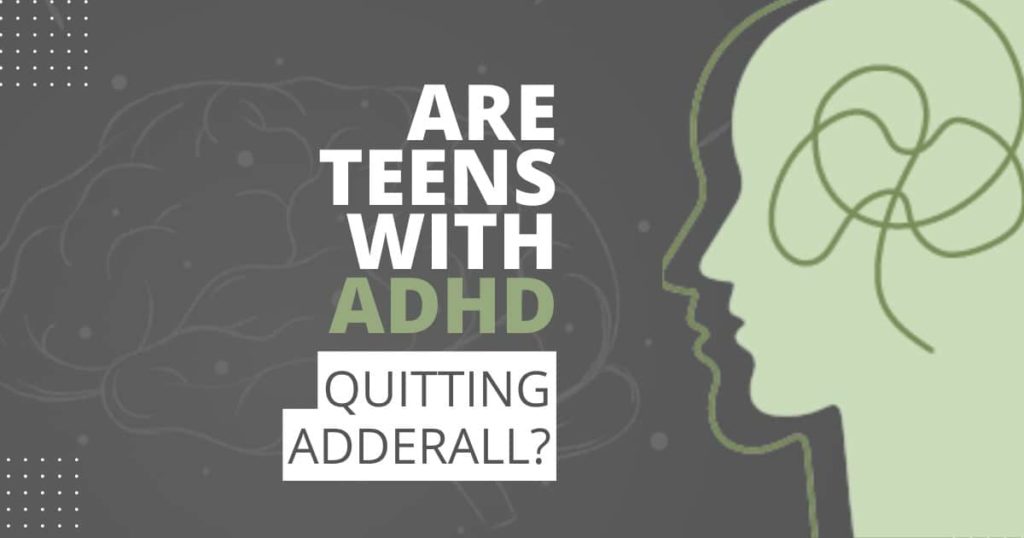There are growing reports of teens with ADHD deciding to quit Adderall. These reports are likely because of the many side effects it can come with. There’s also an Adderall shortage in the United States, which may influence some decisions. While Adderall does have some benefits for people with ADHD, the side effects might outweigh those, although it’s a personal decision.
The following is a guide to what teens and parents should know about quitting Adderall.
Adderall and ADHD
Attention deficit hyperactivity disorder or ADHD is one of the most common childhood neurodevelopmental disorders. ADHD is usually first diagnosed in childhood and then lasts through adulthood. A child with this condition might have difficulty paying attention and controlling their impulsive behaviors and may be overly active.
It’s somewhat normal for kids to have a tough time sitting still and focusing from time to time, but with ADHD it becomes an ongoing, consistent problem that causes issues at school, at home, and in relationships with friends and family.
Children with ADHD might have symptoms such as daydreaming often, forgetting or losing things, talking too much, or fidgeting. They might also make careless mistakes, have a hard time resisting temptations, and have a hard time taking turns and getting along with others.
There are a few types of ADHD.
- One is predominantly inattentive presentation, with symptoms including the inability to finish tasks or pay attention to details. Someone with the predominantly inattentive subtype of ADHD may get distracted easily or forget their daily routines.
- The predominantly hyperactive-impulsive presentation is when someone talks, fidgets, and has difficulty sitting still for long periods. Smaller kids with this type of ADHD might jump, run or climb all the time, and the child may experience restlessness and be impulsive and interruptive.
- Combined presentation is the third subtype of ADHD, in which a child has symptoms of both types equally.
For most children with ADHD, treatment involves a combination of behavioral therapy and medication. Behavioral therapy and parental training are the first-line treatment approaches for younger kids before trying medication.
If someone is prescribed medication for ADHD, it might be Adderall, a combination of amphetamine and dextroamphetamine. Adderall is a prescription central nervous system stimulant that can help improve focus and attention and reduce impulsivity. The prescription stimulant is also available as extended-release capsules, Adderall XR.
Adderall is a controlled substance, leading to substance use disorders or physical dependence. Prescription medication also has the potential for abuse, especially with long-term use.
Common side effects can include:
- Lack of appetite
- Chest pain
- Increased heart rate
- Problems sleeping
- Abdominal pain
- Constipation
- Headaches
- Dry mouth
- Nausea
- Weight loss
- Dizziness
- Anxiety
Long-term Adderall use can lead to brain changes. For example, it may decrease the amount of dopamine, which is more likely when people abuse Adderall but can affect anyone.
- There are also serious potential side effects of stimulant medications, such as an allergic reaction, shortness of breath, worsening psychological symptoms, irregular heartbeat, and an increased risk of a heart attack.
- When Adderall is taken at prescribed doses for ADHD, it doesn’t usually create a high. However, some people who take Adderall, whether by prescription or not, may feel a euphoric high. They might feel focused, excited, and self-confident, which can trigger psychological dependence.
- People with psychiatric disorders have to tell their doctor about their medical history before taking a prescription drug like Adderall. It can worsen symptoms of bipolar disorder, anxiety disorders, and other psychiatric disorders.
Adderall Shortage
Some teens might be opting to stop using Adderall right now out of necessity. Many pharmacies are reporting shortages of the drugs, likely due to a combination of increases in diagnoses and supply disruptions.
In 2021, Adderall prescriptions went up from 37 million the year before to 41 million. People taking high doses of Adderall can develop a tolerance, so they may seek out more of it, increasing the demand and putting more strain on the supply.
If someone’s Adderall isn’t available, they can experience a crash. Symptoms of an Adderall crash include depression, problems sleeping, panic attacks, and suicidal ideation. These side effects are more severe in people who use Adderall at high doses.
Another issue right now is that since Adderall is a controlled substance, the federal government puts quotas on how much of the substance can be produced.
When Should a Child or Teen Stop Using Adderall?
It’s not always clear when a child or teen should stop using their ADHD medication. There are many reasons a parent or child might be thinking about it, including side effects or when the child doesn’t want to take it anymore. This often happens when they hit their teen years, and some children and teens want to experiment to see if they need it anymore.
Reasons can also include that the child has been free of symptoms for at least a year, the dose hasn’t needed to be increased, or the symptoms aren’t noticeable on the days when a child doesn’t take the medication or forgets to take it.
Teens and ADHD Medicine
Prescription stimulant misuse is an increasing problem among teens and young adults, especially college students, so many parents might think it wouldn’t be hard to get their teen to take their prescribed medicine. The misuse of Adderall is because it’s a so-called study drug, and along with a high, it can help students stay up for longer and study. College campuses are working to address the issues with illicit and prescription drugs, including Adderall.
In reality, teens often become non-compliant with their medication. Teens often explore their sense of independence, so they may be resistant to doing many things.
You should talk to your teen’s doctor if they’d like to stop using the medication.
When quitting Adderall for teens, parents and their teens should keep the following in mind:
- No one should go off medicine without talking to a medical professional. Adderall can cause physical dependence, meaning withdrawal symptoms can occur if your teen stops suddenly. When talking to a doctor about quitting Adderall for teens, they can provide a tapering dose that will reduce or eliminate Adderall’s side effects of withdrawal.
- A teen shouldn’t try to stop taking other medications simultaneously as they’re working on quitting Adderall.
- If you’re a parent, you want to be alert to changes in your teen’s life that could be causing behavioral changes, and don’t automatically assume everything is because of withdrawal symptoms.
- Talk to your teen about why they want to stop using the stimulant drug, and monitor their feelings throughout the process.
What About Adderall Abuse and Addiction?
If your teen is experiencing signs of Adderall abuse or addiction, you may need a mental health professional to help you. Adderall stimulates the reward centers in the brain, which play a role in cravings and addiction, according to the National Institute on Drug Abuse. Someone with an addiction to Adderall is using it compulsively. Signs of the misuse of prescription stimulants like Adderall can include:
- Continuing to use the drug even though it’s causing known consequences and adverse effects such as worsening medical conditions
- Changing routines and habits.
- Taking larger doses to get the desired effects and developing a tolerance
- Using the drug in dangerous situations or behaving recklessly.
- Being unsuccessful in attempts to stop or cut back
Adderall abuse recovery is possible but requires behavioral therapy and integrated treatment approaches.
ADHD Treatment for Teens in Southern California
Contact Hillside Horizon for Teens today by calling 855-746-8378 if you’d like to learn more about ADHD treatments available for your teen. We will find the right medication and program that fits their unique needs.




